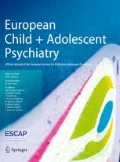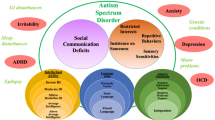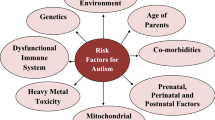Abstract
Asperger syndrome (AS) is a chronic neurodevelopmental disorder of social interaction, communication, and a restricted range of behaviors or interests. Although not generally associated with intellectual disability, the severe social disability and, in many cases, associated mental health and other medical problems, result in disability throughout life. The diagnosis is often delayed, sometimes into adulthood, which is unfortunate because there are now a range of interventions available, and the current evidence supports intervention starting as early in childhood as possible. The aim of this review is to present a description of AS, an up to date synopsis of the literature pertaining to its etiology, co-morbidity and intervention options, and a discussion of current nosological controversies.
Similar content being viewed by others
References
American Psychiatric Association (1994) Diagnostic and statistical manual of mental disorders, 4th edn. American Psychiatric Association, Washington, DC
Anneren G, Dahl N, Uddenfeldt U, Janols LO (1995) Asperger syndrome in a boy with a balanced de novo translocation: t(17;19)(p13.3;p11) [letter]. Am J Med Genet 56:330–331
Asperger H (1944) Die “autistichen Psychopathen” im Kindersalter. Archive fur psychiatrie und Nervenkrankheiten 117:76–136
Bailey A, Le Couteur A, Gottesman I, Bolton P (1995) Autism as a strongly genetic disorder: evidence from a British twin study. Psychol Med 25:63–77
Baron-Cohen S (1995) Mindblindness. MIT Press, Cambridge
Baron-Cohen S, Hammer J (1997) Is autism an extreme form of the “male brain”? Adv Infancy Res 11:193–217
Baron-Cohen S, Scahill VL, Izaguirre J, Hornsey H, Robertson MM (1999) The prevalence of Gilles de la Tourette syndrome in children and adolescents with autism: a large scale study. Psychol Med 29:1151–1159
Baron-Cohen S, Wheelwright S, Skinner R, Martin J, Clubley E (2001) The autism-spectrum quotient (AQ): evidence from Asperger syndrome/high-functioning autism, males and females, scientists and mathematicians. J Autism Dev Disord 31:5–17 (erratum appears in J Autism Dev Disord 2001 Dec;31(6):603)
Bauman M, Kemper TL (1985) Histoanatomic observations of the brain in early infantile autism. Neurology 35:866–874
Bauman ML (1996) Brief report: neuroanatomic observations of the brain in pervasive developmental disorders. J Autism Dev Disord 26:199–203
Bejerot S (2007) An autistic dimension: a proposed subtype of obsessive–compulsive disorder. Autism 11:101–110
Berument SK, Rutter M, Lord C, Pickles A, Bailey A (1999) Autism screening questionnaire: diagnostic validity. Br J Psychiatry 175:444–451
Bolton P, Macdonald H, Pickles A, Rios P et al (1994) A case-control family history study of autism. J Child Psychol Psychiatry 35:877–900
Bradford Y, Haines J, Hutcheson H, Gardiner M, Braun T, Sheffield V, Cassavant T, Huang W, Wang K, Vieland V, Folstein S, Santangelo S, Piven J (2001) Incorporating language phenotypes strengthens evidence of linkage to autism. Am J Med Genet 105:539–547
Buxbaum JD, Silverman JM, Smith CJ, Kilifarski M, Reichert J, Hollander E, Lawlor BA, Fitzgerald M, Greenberg DA, Davis KL (2001) Evidence for a susceptibility gene for autism on chromosome 2 and for genetic heterogeneity. Am J Hum Genet 68:1514–1520 (erratum appears in Am J Hum Genet 2001 Aug;69(2):470)
CLSA (1999) An autosomal genomic screen for autism. Am J Med Genet (Neuropsychiatr Genet) 88:609–615
Cook EH Jr, Rowlett R, Jaselskis C, Leventhal BL (1992) Fluoxetine treatment of children and adults with autistic disorder and mental retardation. J Am Acad Child Adolesc Psychiatry 31:739–745
Courchesne E, Townsend J, Saitoh O (1994) The brain in infantile autism: posterior fossa structures are abnormal. Neurology 44:214–223
Courchesne E, Yeung-Courchesne R, Press GA, Hesselink JR, Jernigan TL (1988) Hypoplasia of cerebellar vermal lobules VI and VII in autism. N Engl J Med 318:1349–1354
Denckla M (1983) The neuropsychology of social–emotional learning disabilities. Arch Neurol 40:461–462
Ehlers S, Gillberg C (1993) The epidemiology of Asperger syndrome. A total population study. J Child Psychol Psychiatry 34:1327–1350
Ehlers S, Gillberg C, Wing L (1999) A screening questionnaire for Asperger syndrome and other high-functioning autism spectrum disorders in school age children. J Autism Dev Disord 29:129–141
Filipek P (2005) Medical aspects of autism. In: Volkmar FR, Klin A, Paul R, Cohen DJ (eds) Handbook of autism and pervasive developmental disorders. Wiley, Hoboken, pp 534–578
Fletcher PC, Happe F, Frith U, Baker SC, Dolan RJ, Frackowiak RS, Frith CD (1995) Other minds in the brain: a functional imaging study of “theory of mind” in story comprehension. Cognition 57:109–128
Folstein S, Rutter M (1977) Infantile autism: a genetic study of 21 twin pairs. J Child Psychol Psychiatry 18:297–321
Fombonne E (2005) Epidemiological studies of pervasive developmental disorders. In: Volkmar FR, Klin A, Paul R, Cohen DJ (eds) Handbook of autism and pervasive developmental disorders. Wiley, Hoboken, pp 42–69
Fombonne E, Tidmarsh L (2003) Epidemiologic data on Asperger disorder. Child Adolesc Psychiatr Clin N Am 12:15–21
Frith U (1991) Autism and Asperger’s syndrome. Cambridge University Press, Cambridge
Ghaziuddin M (2008) Defining the behavioral phenotype of Asperger syndrome. J Autism Dev Disord 38:138–142
Ghaziuddin M (2005) A family history study of Asperger syndrome. J Autism Dev Disord 35:177–182
Ghaziuddin M, Ghaziuddin N, Greden J (2002) Depression in persons with autism: implications for research and clinical care. J Autism Dev Disord 32:299–306
Ghaziuddin M, Tsai L, Ghaziuddin N (1991) Brief report: violence in Asperger syndrome, a critique. J Autism Dev Disord 21:349–354
Ghaziuddin M, Tsai L, Ghaziuddin N (1991) Fluoxetine in autism with depression (letter; comment). J Am Acad Child Adolesc Psychiatry 30:508–509
Ghaziuddin M, Weidmer-Mikhail E, Ghaziuddin N (1998) Comorbidity of Asperger syndrome: a preliminary report. J Intellect Disabil Res 42:279–283
Gillberg C, Gillberg C, Rastam M, Wentz E (2001) The Asperger syndrome (and high-functioning autism) diagnostic interview (ASDI): a preliminary study of a new structured clinical interview. Autism 5:57–66
Gilliam J (2000) Gilliam Asperger’s disorder scale. PRO-ED, Austin
Happe F (2005) The weak central coherence account of autism. In: Volkmar F, Paul R, Klin A, Donald C (eds) Handbook of autism and pervasive developmental disorders. Wiley, Hoboken, pp 640–649
Happe F, Ehlers S, Fletcher P, Frith U, Johansson M, Gillberg C, Dolan R, Frackowiak R, Frith C (1996) ‘Theory of mind’ in the brain. Evidence from a PET scan study of Asperger syndrome. Neuroreport 8:197–201
Hazell P (2007) Drug therapy for attention-deficit/hyperactivity disorder-like symptoms in autistic disorder. J Paediatr Child Health 43:19–24
Hill EL (2004) Evaluating the theory of executive dysfunction in autism. Dev Rev 24:189–233
Hippler K, Klicpera C (2003) A retrospective analysis of the clinical case records of ‘autistic psychopaths’ diagnosed by Hans Asperger and his team at the University Children’s Hospital, Vienna. Philos Trans R Soc Lond B Biol Sci 358:291–301
Howlin P (2000) Outcome in adult life for more able individuals with autism or Asperger syndrome. Autism 4:63–83
International Molecular Genetic Study of Autism Consortium (2001) A genomewide screen for autism: strong evidence for linkage to chromosomes 2q, 7q, and 16p. Am J Hum Genet 69:570–581
Kanner L (1943) Autistic disturbances of affective contact. Nerv Child 2:217–250
Klin A, McPartland J, Volkmar FR (2005) Asperger syndrome. In: Volkmar FR, Klin A, Paul R, Cohen DJ (eds) Handbook of autism and pervasive developmental disorders. Wiley, Hoboken, pp 88–125
Klin A, Pauls D, Schultz R, Volkmar F (2005) Three diagnostic approaches to Asperger syndrome: implications for research. J Autism Dev Disord 35:221–234
Klin A, Volkmar FR (1997) Asperger’s syndrome. In: Cohen DJ, Volkmar FR (eds) Handbook of autism & pervasive developmental disorders. Wiley, New York, pp 94–122
Klin A, Volkmar FR (2000) Treatment and intervention guidelines for individuals with Asperger syndrome. In: Klin A, Volkmar FR (eds) Asperger syndrome. The Guilford Press, New York, pp 340–366
Kwon H, Ow A, Pedatella K, Lotspeich L, Reiss A (2004) Voxel-based morphometry elucidates structural neuroanatomy of high-functioning autism and Asperger syndrome. Dev Med Child Neurol 46:760–764
Lainhart JE (1999) Psychiatric problems in individulas with autism, their parents and siblings. Int Rev Psychiatry 11:278–298
Lainhart JE, Piven J, Wzorek M, Landa R, Santangelo SL, Coon H, Folstein SE (1997) Macrocephaly in children and adults with autism. J Am Acad Child Adolesc Psychiatry 36:282–290
Leekam S, Libby S, Wing L, Gould J, Gillberg C (2000) Comparison of ICD-10 and Gillberg’s criteria for Asperger syndrome. Autism 4:11–28
Lincoln A, Courchesne E, Allen M, Hanson E, Ene M (1998) Neurobiology of Asperger syndrome: seven case studies and quantitative magnetic resonance imaging findings. In: Schopler E, Mesibov GB, Kunc LJ (eds) Asperger syndrome or high functioning autism? Plenum, New York, pp 145–166
Lord C, Risi S, Lambrecht L, Cook EH, Leventhal BL, DiLavore PC, Pickles A, Rutter M (2000) The autism diagnostic observation schedule—generic: a standard measure of social and communication deficits associated with the spectrum of autism. J Autism Dev Disord 30:205–223
Lord C, Rutter M, Le Couteur A (1994) Autism diagnostic interview—revised: a revised version of a diagnostic interview for caregivers of individuals with possible pervasive developmental disorders. J Autism Dev Disord 24:659–685
Martin A, Koenig K, Anderson GM, Scahill L (2003) Low-dose fluvoxamine treatment of children and adolescents with pervasive developmental disorders: a prospective, open-label study. J Autism Dev Disord 33:77–85
Mawhood L, Howlin P, Rutter M (2000) Autism and developmental receptive language disorder—a comparative follow-up in early adult life. I: Cognitive and language outcomes. J Child Psychol Psychiatry 41:547–559
Mayes SD, Calhoun SL, Crites DL (2001) Does DSM-IV Asperger’s disorder exist? J Abnorm Child Psychol 29:263–271
McDougle CJ, Brodkin ES, Naylor ST, Carlson DC, Cohen DJ, Price LH (1998) Sertraline in adults with pervasive developmental disorders: A prospective open-label investigation. J Clin Psychopharmacol 18:62–66
McDougle CJ, Naylor ST, Cohen DJ, Volkmar FR, Heninger GR, Price LH (1996) A double-blind, placebo-controlled study of fluvoxamine in adults with autistic disorder (see comments). Arch Gen Psychiatry 53:1001–1008
Miller JN, Ozonoff S (2000) The external validity of Asperger disorder: lack of evidence from the domain of neuropsychology. J Abnorm Psychol 109:227–238
Mundy P (2003) The neural basis of social impairments in autism: the role of the dorsal medial–frontal cortex and anterior cingulate system. J Child Psychol Psychiatry 44:793–809
Murphy D (2002) Asperger’s Syndrome: forensic considerations. Forensic Update 68:10–16
Myles BS (2001) Asperger syndrome diagnostic scale. PRO-ED, Austin
Namerow LB, Thomas P, Bostic JQ, Prince J, Monuteaux MC (2003) Use of citalopram in pervasive developmental disorders. J Dev Behav Pediatr 24:104–108
Paul R (2003) Promoting social communication in high functioning individuals with autistic spectrum disorders. Child Adoles Psychiatr Clin N Am 12:87–106 (vi–vii)
Pericak-Vance MA (2003) The genetics of autistic disorder. In: Plomin R, DeFries JC et al (eds) Behavioral genetics in the postgenomic era. American Psychological Association, Washington, DC, pp 267–288
Posey DJ, Guenin KD, Kohn AE, Swiezy NB, McDougle CJ (2001) A naturalistic open-label study of mirtazapine in autistic and other pervasive developmental disorders. J Child Adolesc Psychopharmacol 11:267–277
Research Units on Pediatric Psychopharmacology Autism Network (2002) Risperidine in children with autism and serious behavioral problems. N Eng J Med 347:314–321
Research Units on Pediatric Psychopharmacology Autism Network (2005) Randomized, controlled, crossover trial of methylphenidate in pervasive developmental disorders with hyperactivity. Arch Gen Psychiatry 62:1266–1274
Riddle MA, Bernstein GA, Cook EH, Leonard HL, March JS, Swanson JM (1999) Anxiolytics, adrenergic agents, and naltrexone. J Am Acad Child Adolesc Psychiatry 38:546–556
Rinehart NJ, Bradshaw JL, Tonge BJ, Brereton AV, Bellgrove MA (2002) A neurobehavioral examination of individuals with high-functioning autism and Asperger disorder using a fronto-striatal model of dysfunction. Behav Cogn Neurosci Rev 1:164–177
Ring H, Woodbury-Smith M, Watson P, Wheelwright S, Baron-Cohen S (2008) Clinical heterogeneity among people with high functioning autism spectrum conditions evidence favouring a continuous severity gradient. Behav Brain Funct 4:11
Ring HA, Baron-Cohen S, Wheelwright S, Williams SC, Brammer M, Andrew C, Bullmore ET (1999) Cerebral correlates of preserved cognitive skills in autism: a MRI study of embedded figures task performance. Brain 122:1305–1315
Rourke BP (1987) Syndrome of nonverbal learning disabilities: the final common pathway of white-matter disease/dysfunction? Clin Neuropsychol 1:209–234
Rourke BP, Tsatsanis KD (2000) Nonverbal learning disabilities and Asperger syndrome. In: Klin A, Volkmar FR (eds) Asperger syndrome. The Guilford Press, New York, pp 231–253
Scahill L, Martin A (2005) Psychopharmacology. In: Volkmar F, Paul R, Klin A, Donald C (eds) Handbook of autism and pervasive developmental disorders. Wiley, Hoboken, pp 1102–1120
Schultz RT, Gauthier I, Klin A, Fulbright RK, Anderson AW, Volkmar F, Skudlarski P, Lacadie C, Cohen DJ, Gore JC (2000) Abnormal ventral temporal cortical activity during face discrimination among individuals with autism and Asperger syndrome. Arch Gen Psychiatry 57:331–340
Schultz RT, Grelotti DJ, Klin A, Kleinman J, Van der Gaag C, Marois R, Skudlarski P (2003) The role of the fusiform face area in social cognition: implications for the pathobiology of autism. Philos Trans R Soc Lond Ser B Biol Sci 358:415–427
Schultz RT, Romanski LM, Tsatsanis KD (2000) Neurofunctional models of autistic disorder and Asperger syndrome: clues from neuroimaging. In: Klin A, Volkmar FR (eds) Asperger syndrome. The Guilford Press, New York, pp 172–209
Seltzer MM, Krauss MW, Shattuck PT, Orsmond G, Swe A, Lord C (2003) The symptoms of autism spectrum disorders in adolescence and adulthood. J Autism Dev Disord 33:565–581
Shao Y, Cuccaro ML, Hauser ER, Raiford KL, Menold MM, Wolpert CM, Ravan SA, Elston L, Decena K, Donnelly SL, Abramson RK, Wright HH, DeLong GR, Gilbert JR, Pericak-Vance MA (2003) Fine mapping of autistic disorder to chromosome 15q11-q13 by use of phenotypic subtypes. Am J Hum Genet 72:539–548
Shao Y, Raiford KL, Wolpert CM, Cope HA, Ravan SA, Ashley-Koch AA, Abramson RK, Wright HH, DeLong RG, Gilbert JR, Cuccaro ML, Pericak-Vance MA (2002) Phenotypic homogeneity provides increased support for linkage on chromosome 2 in autistic disorder. Am J Hum Genet 70:1058–1061
Shao Y, Wolpert CM, Raiford KL, Menold MM, Donnelly SL, Ravan SA, Bass MP, McClain C, von Wendt L, Vance JM, Abramson RH, Wright HH, Ashley-Koch A, Gilbert JR, DeLong RG, Cuccaro ML, Pericak-Vance MA (2002) Genomic screen and follow-up analysis for autistic disorder. Am J Med Genet 114:99–105
South M, Ozonoff S, McMahon W (2005) Repetitive behavior profiles in apserger syndrome adn high-functioning autism. J Autism Dev Disord 35:145–158
Spiker D, Lotspeich LJ, Dimiceli S, Myers RM, Risch N (2002) Behavioral phenotypic variation in autism multiplex families: evidence for a continuous severity gradient. Am J Med Genet 114:129–136
Steingard RJ, Zimnitzky B, DeMaso DR, Bauman ML, Bucci JP (1997) Sertraline treatment of transition-associated anxiety and agitation in children with autistic disorder. J Child Adolesc Psychopharmacol 7:9–15
Stone J, Merriman B, Cantor RY, Gilliam T, Geshwind D, Nelson S (2004) Evidence for sex specific risk alleles in autism spectrum disorder. Am J Hum Genet 75:1117–1123
Szatmari P, MacLean JE, Jones MB, Bryson SE, Zwaigenbaum L, Bartolucci G, Mahoney WJ, Tuff L (2000) The familial aggregation of the lesser variant in biological and nonbiological relatives of PDD probands: a family history study. J Child Psychol Psychiatry 41:579–586
Tantam D (2000) Adolescence and adulthood of individuals with Asperger syndrome. In: Klin A, Volkmar FR (eds) Asperger syndrome. The Guilford Press, New York, pp 367–399
Tantam D (1991) Asperger syndrome in adulthood. In: Frith U (eds) Autism and Asperger syndrome. Cambridge University Press, Cambridge
Tantam D (2000) Psychological disorder in adolescents and adults with Asperger syndrome. Autism 4:47–62
Tentler D, Johannesson T, Johansson M, Rastam M, Gillberg C, Orsmark C, Carlsson B, Wahlstrom J, Dahl N (2003) A candidate region for Asperger syndrome defined by two 17p breakpoints. Eur J Hum Genet 11:189–195
Veenstra-VanderWeele J, Cook EH Jr (2004) Molecular genetics of autism spectrum disorder. Mol Psychiatry 9:819–832
Volkmar FR, Klin A (2000) Diagnostic issues in Asperger syndrome. In: Klin A, Volkmar FR (eds) Asperger syndrome. The Guilford Press, New York, pp 25–71
Volkmar FR, Klin A, Pauls D (1998) Nosological and genetic aspects of Asperger syndrome. J Autism Dev Disord 28:457–463
Volkmar FR, Klin A, Schultz R, Bronen R, Marans WD, Sparrow S, Cohen DJ (1996) Asperger’s syndrome (clinical conference). J Am Acad Child Adolesc Psychiatry 35:118–123
Volkmar FR, Klin A, Schultz RT, Rubin E, Bronen R (2000) Asperger’s disorder. Am J Psychiatry 157:262–267
Volkmar FR, Klin A, Siegel B, Szatmari P, Lord C, Campbell M, Freeman BJ, Cicchetti DV, Rutter M, Kline W et al (1994) Field trial for autistic disorder in DSM-IV. Am J Psychiatry 151:1361–1367
Wallace GL, Treffert DA (2004) Head size and autism. Lancet 363:1003–1004
Weintraub S, Mesulam MM (1983) Developmental learning disabilities of the right hemisphere. Emotional, interpersonal, and cognitive components. Arch Neurol 11:463–468
Welchew DE, Ashwin C, Berkouk K, Salvador R, Suckling J, Baron-Cohen S, Bullmore E (2005) Functional disconnectivity of the medial temporal lobe in Asperger’s syndrome. Biol Psychiatry 57:991–998
Wing L (1981) Asperger’s syndrome: a clinical account. Psychol Med 11:115–129
Wing L (1997) The autistic spectrum. Pergamon, New York
Wing L, Leekam SR, Libby SJ, Gould J, Larcombe M (2002) The diagnostic interview for social and communication disorders: background, inter-rater reliability and clinical use. J Child Psychol Psychiatry 43:307–325
Wolff S (1991) “Schizoid” personality in childhood and adult life. I: The vagaries of diagnostic labelling. Br J Psychiatry 159:615–620
Wolff S, Barlow A (1979) Schizoid personality in childhood: a comparative study of schizoid, autistic and normal children. J Child Psychol Psychiatry 20:29–46
Woodbury-Smith M, Clare IC, Holland A, Kearns A (2006) High functioning autistic spectrum disorders, offending and other law-breaking: findings from a community sample. J Forensic Psychiatry Psychol 17:108–120
Woodbury-Smith M, Klin A, Volkmar F (2005) Asperger’s syndrome: a comparison of clinical diagnoses and those made according to the ICD-10 and DSM-IV. J Autism Dev Disord 35:235–240
World Health Organization W (1990) International classification of diseases (draft version: Diagnostic criteria for research). WHO, Geneva
Wozniak J, Biederman J, Faraone SV, Frazier J, Kim J, Millstein R, Gershon J, Thornell A, Cha K, Snyder JB (1997) Mania in children with pervasive developmental disorders revisited. J Am Acad Child Adolesc Psychiatry 36:1552–1560
Ylisaukko-oja T, Wendt T-v, Kempas E, Sarenius S, Varilo T, von Wendt L, Peltonen L, Jarvela I (2004) Genome-wide scan for loci of Asperger syndrome. Mol Psychiatry 9:161–168
Ziatas K, Durkin K, Pratt C (2003) Differences in assertive speech acts produced by children with autism, Asperger syndrome, specific language impairment, and normal development. Dev Psychopathol 15:73–94
Author information
Authors and Affiliations
Corresponding author
Rights and permissions
About this article
Cite this article
Woodbury-Smith, M.R., Volkmar, F.R. Asperger syndrome. Eur Child Adolesc Psychiatry 18, 2–11 (2009). https://doi.org/10.1007/s00787-008-0701-0
Accepted:
Published:
Issue Date:
DOI: https://doi.org/10.1007/s00787-008-0701-0




